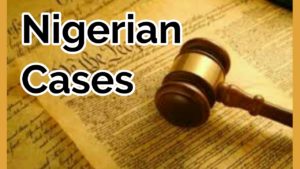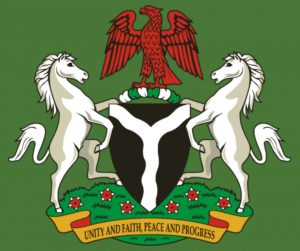Abacha v Fawehinmi SC 45/ 1997, (2000) 6 NWLR 228: This case is centered on the justiciability of ouster clauses promulgated by the Military Government which purports to oust the jurisdiction of the court to entertain certain matters with respect to such promulgation. Here, the question was as to the validity of the Decree suspending the operations of the constitution and ousting the jurisdiction of the court to question the arbitral detention of persons without stating the reasons for such detention.
The court employed golden interpretation to find its way around the harsh military promulgations which poses a direct threat to the fundamental human rights of the citizens during military intervention.

Recommended: Countries with the best judicial system
Facts of the case of Abacha v Fawehinmi
The applicant, Chief Gani Fawehinmi who is a legal practitioner was arrested by the State Security Service (SSS) and the police without warrant. They invaded his house on the 30th January, 1996 to make this arrest. The arrestors did not inform him of the ground or grounds of his arrest; neither did they charge him to court. He was rather detained at the office of the State Security Service in Shangisha after which he was relocated to Bauchi prisons.
His wrongful detention lasted for four days before the detention order was issued. Through his counsel, Fawehinmi applied for the enforcement of his fundamental human right provided in sections 31, 32 and 38 of the 1979 constitution and Article 4, 5, 6 and 12 of the African Charter on Human and People’s Right. This application was brought under the Fundamental Rights (Enforcement Procedure) Rules 1979 at the Federal High Court, Lagos.

Also see: Mojekwu v Mojekwu: Facts, issues and decision of the court
The action sought a declaration that the arrest and detention of the applicant was unconstitutional and in contravention of the applicant’s fundamental human rights as enshrined in the constitution and in the African Charter on Human and People’s Rights, an order of the court to release the applicant from detention, an injunction prohibiting the respondents from further infringement of the applicant’s fundamental human rights, an order for the respondents to charge the applicant to a court of competent jurisdiction in regard of the arrest, and an order of ten million Naira damages for the unlawful arrest and detention of the applicant.
At the trial court, the learned trial court upheld the preliminary objection raised by the respondents which is to the effect that:
1. The court lacks jurisdiction to entertain the matter because the Military Decree No 2 of 1984 ousts the jurisdiction of the court to hear such matters.
2. The provision of the African Charter on Human and People’s Right is an international law with an international flavour and as such, it has no effect or force of law on our domestic jurisdiction. Also that the Charter is inconsistent with the existing Decree No. 107 of 1993 which is the grundnorm, and therefore is null and void to that extent.
3. The detention of the appellant was not unconstitutional because it was validly made pursuant to an existing Decree. That it is moreso, within the powers of the Inspector General of Police to order for such detention by the virtue of the State Security (Detention of Persons) Amendment Decree No. 11 of 1994.
Recommended: Countries with the best education system in the world

Issues determined in Abacha v Fawehinmi
a. What is the status of the African Charter on Human and Peoples Rights which is an international enactment, in relation to the constitution and our local jurisdiction
b. The constitutionality of the respondent’s detention
Recommended: Meaning and functions of the three arms of government
Decision of the court in Abacha v Fawehinmi
On the first issue, Supreme Court pointed out that by the virtue of section 12(1) of the 1979 constitution (presently section 12(1) of the 1999 constitution), an international treaty shall not have the force of law in our domestic jurisdiction except it is enacted into law by National Assembly. It is therefore only by Act of Parliament that a treaty can become enforceable to the same extent as our domestic laws. African Charter on Human and Peoples Right is clearly an international treaty, having been adopted by the Nigerian National Assembly in 1989 by te virtue of its enactment.
When treaties are enacted therefore, it forms part of the domestic enactments and operate to that same extent. The effect of its enactment is that it becomes applicable to the citizens and becomes enforceable by the court of law. The court noted that the rights contained in the African Charter on the Human and Peoples Rights are similar to those contained in the constitution, therefore they are not a strange invention. Its provisions apply with full vigour, having been enacted by the National Assembly.
The enactment in fact wears an international flavour so that it could rightly be said that it possesses more strength and vigour than other domestic enactments. This interpretation is to the reasoning that by its history of being of international origin, its contravention is a breach of an international obligation.
Therefore, African Charter on Human and People’s Rights to this extent will prevail when there is conflict between the enactment and any other domestic law. This is not to say that it is above the constitution, nor does it limit the power of the National Assembly to repeal it.
Also see: Countries with the highest number of hackers in the world
The provisions of the African Charter on Human and Peoples Rights is therefore not affected by the Military Decree purporting to have suspended the constitution, since, moreover, there was no such express mentioning of the Charter. Cap 10 which is the African Charter on Human and Peoples Rights therefore remains preserved.
On the second issue, the court followed its reasoning on the first issue raised to hold that the African Charter on the Human and Peoples Rights which has similar provisions to the human rights provision in the constitution, remains in force regardless of the Military Decree which purports to ousts the jurisdiction of the court to entertain civil suits in respect of acts done pursuant to the Decree.
The court however, did not fault the detention order against the respondent since it was duly signed by the appropriate authority which is the Inspector General of Police. The respondent is however entitled to claim damages for the days which he was in detention before the order was executed.
Recommended: Countries with the best roads in the world
Comment
This is landmark decision by the Supreme Court. The activism of the respondent who was not discouraged by the unfavourable decisions of the lower courts is worth commending. Rather he pushed on to the Supreme Court and finally got a desirable judgment which favours not just him but also the citizen at large by setting a precedent which ameliorates the hardship caused by military intervention and their Decrees. Also the Supreme Court by this decision saved some hope and life for the judicial system.

Edeh Samuel Chukwuemeka, ACMC, is a lawyer and a certified mediator/conciliator in Nigeria. He is also a developer with knowledge in various programming languages. Samuel is determined to leverage his skills in technology, SEO, and legal practice to revolutionize the legal profession worldwide by creating web and mobile applications that simplify legal research. Sam is also passionate about educating and providing valuable information to people.
Good work Samuel.